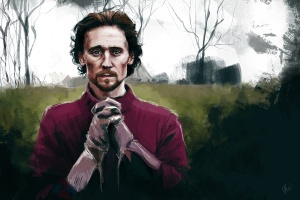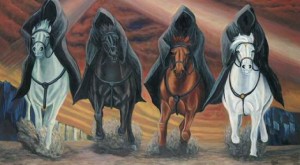The Hundred Years’ War was popular in England. It offered people of different classes the opportunity to go on adventures and get rich. However, from 1377 until 1399, Richard II was king of England. Richard, a grandson of Edward III, was not interested in getting land in France by going to war so it was a time of peace. Chaucer’s vibrant English literature was at its creative peak and English Gothic architecture was developing a new, original style free from French influence. Originality and creativity, a new, confident identity, was emerging most strongly when England turned its back on destruction abroad.

Unfortunately, people preferred destruction. People of all classes wanted their tax money to be spent on war, not wasted on enjoyment and beautiful things. Henry Bolingbroke, another of Edward III’s grandchildren, found that there was support for someone who could get rid of the peace-loving Richard. In 1399, Henry took the crown by force. Richard II died in prison a year later, starved to death. Henry Bolingbroke was now Henry IV. His son, Henry V was to become incredibly popular because he was successful in the war against France.

As the son of a usurper, Henry V had something to prove: God wanted him to be king. Henry V’s victories in France seemed to show that God really was on his and England’s side. This situation continued even after Henry V died in 1422. France could not find an idea to unite behind and the country was on the point of collapse. French people felt that God had deserted them. The hated English were bringing hell to earth in France. The English charged across France destroying, killing, raping, and stealing.

English peasants killed French noblemen. The English were also bringing new, destructive technology: English cannons made the French feel that God really had turned his back on France. God was supporting the terrible English angels of destruction. France and all its treasures would soon be lost to the barbaric English.

Then Joan of Arc emerged. She was a peasant girl from a village in the northeast of France. When she was about twelve, she was visited by supernatural beings of some sort. Later, Joan claimed they were angels. Whatever they were, these beings told her to drive the hated English out of France. Incredibly, she managed to speak to the French king, Charles VII, when she was about sixteen. The king believed her claim that she was directly in communication with God and he seriously listened to her prediction that she could lead the French army to victory. Then, with Charles VII’s permission, she backed up her predictions by actually doing it! She was at the head of aggressive tactics, part of a new, religious war of good against evil, which led to victory at Orleans in 1429.

Now it seemed that God was on the side of France and on the side of women, who could achieve far more than horrible, destructive men. The French went from strength to strength as they followed the lead of a seventeen-year-old girl!
![Joan and the fairies Joan of Arc [large]](http://veryserioso.files.wordpress.com/2014/03/joan-of-arc-large.jpg?w=235)
In May 1430, Joan was captured by the English and put on trial as a witch. It was a religious trial. The English said it was true that Joan was in communication with supernatural beings. However, the English were arguing that Joan was listening to the words of the devil, not God. This would mean that the French king was also on the side of the devil.

Joan was burned at the stake as a witch when she was nineteen. However, this was a disastrously stupid move by the English. No one could believe that Joan was following the devil. The destructive, hated English were obviously on the side of the devil. Also, the trial meant that the story of Joan was recorded very carefully and her legend grew and grew. The French grew stronger and more united and the English were soon kicked out of France completely. Joan’s France was completely victorious.
